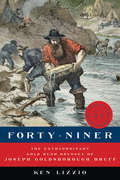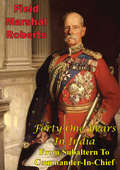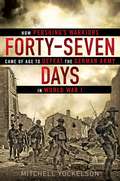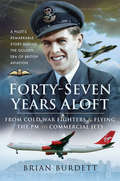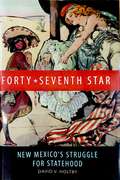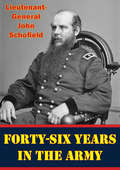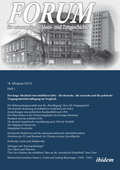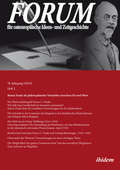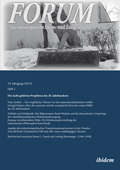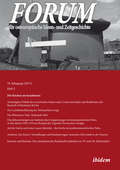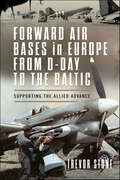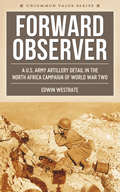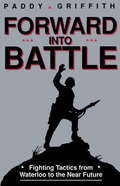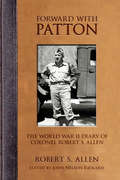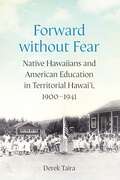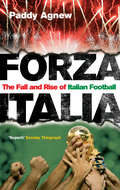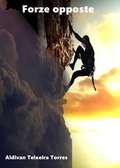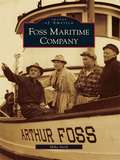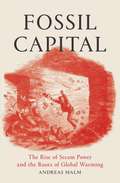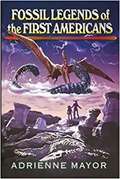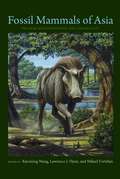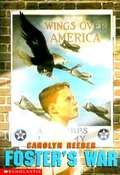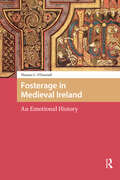- Table View
- List View
Forty-Niner: The Extraordinary Gold Rush Odyssey Of Joseph Goldsborough Bruff (American Grit #0)
by Ken LizzioExperience the majesty and terror of the Gold Rush firsthand While the seminal California Gold Rush of 1849 produced numerous firsthand diaries and accounts, Joseph Goldsborough Bruff’s—widely regarded as the best and most accurate—provides the basis of this narrative reimagining of a quintessential American legend. Ken Lizzio traces the pioneer’s thrilling adventure from the first rumors of gold, through his crossing of the frontier, all the way to his incredible survival and escape to a prosperous life back east. This is the first book to create a narrative of Bruff’s journey from his meticulously written and preserved diary. And with more than fifty of Bruff’s original pencil sketches and paintings, Forty-Niner provides a new, immersive vision of one of America’s most fabled eras. The American Grit series brings you true tales of endurance, survival, and ingenuity from the annals of American history. These books focus on the trials of remarkable individuals with an emphasis on rich primary source material and artwork.
Forty-One Years In India - From Subaltern To Commander-In-Chief [Illustrated Edition]
by Field-Marshal Lord Roberts Of Kandahar V.C. K.P. G.C.B. G.C.S.I. G.C.I.E.[Includes over 140 maps, portraits and illustrations]Field Marshal "Bob" Roberts was one the most successful and well-loved generals of the British Army, decorated and distinguished in many actions and holder of the highest award for valour in action the Victoria Cross. He fought and commanded in Abyssinia, the UK and South Africa to great acclaim; however the majority of his life was spent on service in India and Afghanistan.His history and that of the British Raj entwined from his birth at Cawnpore in 1832 [modern day Kanpur] son of General Abraham Roberts, until he left India in 1895. Only a scant six years of service experience could not prepare the future Field Marshal for the irruption of the Indian Mutiny in 1857, in which he was conspicuous for his bravery and won his V.C.. Almost half of his autobiography is given over to the actions that he was involved in during the Sepoy Revolt; such as the siege of Delhi and the relief of Lucknow. He served in the second Anglo-Afghan War with distinction and received the thanks of Parliament; and commanded the punitive expedition to Kandahar in 1879 winning the decisive battle of Kandahar in September 1880. By this time he was a pillar of the British Empire and one of its foremost generals, and served on with distinction for many years in the sub-continent.An excellent, well-written memoir of a legend of the British Empire.
Forty-Seven Days
by Mitchell YockelsonThe gripping account of the U.S. First Army's astonishing triumph over the Germans in America's bloodiest battle of the First World War--the Battle of the Meuse-Argonne. The Battle of the Meuse-Argonne stands as the deadliest clash in American history: More than a million untested American soldiers went up against a better-trained and -experienced German army, costing more twenty-six thousand deaths and leaving nearly a hundred thousand wounded. Yet in forty-seven days of intense combat, those Americans pushed back the enemy and forced the Germans to surrender, bringing the First World War to an end--a feat the British and the French had not achieved after more than three years of fighting. In Forty-Seven Days, historian Mitchell Yockelson tells how General John J. "Black Jack" Pershing's exemplary leadership led to the unlikeliest of victories. Appointed commander of the American Expeditionary Forces by President Wilson, Pershing personally took command of the U.S. First Army until supplies ran low and the fighting ground to a stalemate. Refusing to admit defeat, Pershing stepped aside and placed gutsy Lieutenant General Hunter Liggett in charge. While Pershing retained command, Liggett reorganized his new unit, resting and resupplying his men, while instilling a confidence in the doughboys that drove them out of the trenches and across no-man's-land. Also explored are a cast of remarkable individuals, including America's original fighter ace, Eddie Rickenbacker; Corporal Alvin York, a pacifist who nevertheless single-handedly killed more than twenty Germans and captured 132; artillery officer and future president Harry S. Truman; innovative tank commander George S. Patton; and Douglas MacArthur, the Great War's most decorated soldier, who would command the American army in the Pacific War and in Korea. Offering an abundance of new details and insight, Forty-Seven Days is the definitive account of the First Army's hard-fought victory in World War I--and the revealing tale of how our military came of age in its most devastating battle.
Forty-Seven Years Aloft: From Cold War Fighters & Flying the PM to Commercial Jets
by Brian Burdett&“A journey through 47 years of aviation history through the memories of one pilot. From . . . &‘antics&’ in jet fighters, and civil aviation to retirement.&” —Vintage Airfix It all began for London-born Brian Burdett, as it has for so many, with the Air Cadets, flying Tiger Moths at the age of just fourteen. He obtained his civil license at the age of seventeen, and six months later he was accepted into the RAF. The year was 1954. It was to fly Hunters that Brian was posted to 257 (Burma) Squadron at Wattisham in Suffolk, where the jets were frequently scrambled to intercept Soviet intruders in the dark days of the Cold War. His RAF career developed further with a transfer to Transport Command where Brian could fly the planes he loved the best—the big jets. After training on Handley Page Hastings, Brian was given the chance to fly the famous de Havilland on long-distance routes between the RAF bases around the world, through the Middle East, Pakistan, Sri Lanka and down to South Africa and Australasia. He eventually turned to the commercial world, flying Falcons, VC 10s, Tristars and every type of Boeing 747, for a variety of airlines. His adventures are legion. From a double engine failure on takeoff and still managing to land safely, to losing control in cloud and leveling off feet from the ground, to a midair near miss with an American aircraft that no-one knew was there, to spotting a strange object that remains unidentified to this day. &“A fascinating career in military aviation and commercial aviation spanning 47 years . . . Highly Recommended.&” —Firetrench
Forty-Seventh Star
by David V. HoltbyNew Mexico was ceded to the United States in 1848, at the end of the war with Mexico, but not until 1912 did President William Howard Taft sign the proclamation that promoted New Mexico from territory to state. Why did New Mexico's push for statehood last sixty-four years? Conventional wisdom has it that racism was solely to blame. But this fresh look at the history finds a more complex set of obstacles, tied primarily to self-serving politicians. Forty-Seventh Star, published in New Mexico's centennial year, is the first book on its quest for statehood in more than forty years. David V. Holtby closely examines the final stretch of New Mexico's tortuous road to statehood, beginning in the 1890s. His deeply researched narrative juxtaposes events in Washington, D. C. , and in the territory to present the repeated collisions between New Mexicans seeking to control their destiny and politicians opposing them, including Republican U. S. senators Albert J. Beveridge of Indiana and Nelson W. Aldrich of Rhode Island. Holtby places the quest for statehood in national perspective while examining the territory's political, economic, and social development. He shows how a few powerful men brewed a concoction of racism, cronyism, corruption, and partisan politics that poisoned New Mexicans' efforts to join the Union. Drawing on extensive Spanish-language and archival sources, the author also explores the consequences that the drive to become a state had for New Mexico's Euro-American, Nuevomexicano, American Indian, African American, and Asian communities. Holtby offers a compelling story that shows why and how home rule mattered--then and now--for New Mexicans and for all Americans.
Forty-Six Years In The Army [Illustrated Edition]
by Lieutenant-General John SchofieldIncludes Civil War Map and Illustrations Pack - 224 battle plans, campaign maps and detailed analyses of actions spanning the entire period of hostilities."John McAllister Schofield began his very successful military career after graduating seventh from the United States Military Academy in 1853.At the outbreak of the war, Schofield first served as mustering officer for the state of Missouri, received the promotion of major of the 1st Missouri Infantry, and served as chief-of-staff under General Nathaniel Lyon at the battle of Wilson's Creek. In January of 1864, Schofield led the Army of the Ohio during the Atlanta Campaign under William T. Sherman. When Sherman set off on his infamous "March to the Sea," Schofield and his command were left under George H. Thomas to stop the invasion of Tennessee led by Confederate General John B. Hood. On November 30, 1864, Schofield successfully repulsed John Bell Hood during the battle of Franklin, and effectively crippled Hood's army. Two weeks later, during the battle of Nashville, General Thomas used Schofield and his XXIII Corps to effectively destroy what was left of Hood's army. Schofield received a promotion to brigadier in the regular army for his actions at Franklin.Schofield was again moved to fight under Sherman in North Carolina. He captured Wilmington, and fought at the battle of Kinston before meeting up with Sherman on March 23, 1865 in Goldsboro. Working together with Sherman, Schofield led the Department of North Carolina until the surrender of Joseph E. Johnston at Durham Station. For his service, he was brevetted to major general in the regular army.After the war, Schofield went on to become the Secretary of War under President Johnson. He helped with the recommendation of making a naval base a Pearl Harbor, Hawaii, and eventually was promoted to lieutenant general."- CWT
Forum für osteuropäische Ideen- und Zeitgeschichte. 18. Jahrgang, Heft 1 [German-language Edition]
by Leonid Luks John Andreas Fuchs Gunter Dehnert Nikolaus Lobkowicz Alexei RybakowSince 1997, FORUM is an integral part of the journal landscape of European Studies. In addition to facts of contemporary history, it offers deep insights into the history of ideas, reflects current discussions, and provides reviews of books on Central and Eastern European history. Especially on the history of ideas and contemporary history it offers more than ?just? history -- e.g. interdisciplinary discussions by political scientists, literary, legal, and economic scholars and philosophers. FORUM sees itself as a bridge between East and West. Through the translation and publication of documents and contributions from Russian, Polish, and Czech researchers it offers the Western reader insight into the scientific discourse within Eastern Europe.Volume 18, Issue 1: The way the Federal Republic of Germany dealt with its past is seen by some as a role model for many post-authoritarian and post-totalitarian transition countries in East and West, despite some downsides of the long process of coping with the past after the German ?zero hour?. The current FORUM issue focuses on the comparison of the specifics of German memory culture with those of the Eastern European countries, especially Poland and Russia, since the beginning of their de-Stalinization debates.Seit 1997 ist das FORUM fester Bestandteil der Zeitschriftenlandschaft der Osteuropaforschung. Neben Fakten der Zeitgeschichte bietet es tiefe Einblicke in die Ideengeschichte, spiegelt aktuelle Diskussionen wider und liefert Rezensionen zu Werken der mittel- und osteuropäischen Zeitgeschichte. Gerade in den Rubriken Ideengeschichte und Zeitgeschichte bietet es mehr als "nur" Geschichte -- fächerübergreifend kommen u.a. Politologen, Literatur-, Rechts- und Wirtschaftswissenschaftler sowie Philosophen zu Wort. Das FORUM versteht sich als Brücke zwischen Ost und West. Durch die Übersetzung und Veröffentlichung von Dokumenten und Beiträgen aus dem Russischen, Polnischen und Tschechischen bietet es dem westlichen Leser Einblicke in den wissenschaftlichen Diskurs Osteuropas. Heft 1/2014: Der lange Abschied vom totalitären Erbe Das Modell der bundesrepublikanischen Vergangenheitsbewältigung gilt als Vorbild für viele postautoritäre bzw. posttotalitäre Transformationsstaaten in Ost und West, ungeachtet mancher Schattenseiten des langwierigen Prozesses der deutschen Vergangenheitsbewältigung nach der "Stunde Null". Das aktuelle Forum-Heft vergleicht in seinem thematischen Schwerpunkt die Spezifika der deutschen Erinnerungskultur mit denjenigen der osteuropäischen Länder, vor allem Polens und Russlands, seit dem Beginn der Entstalinisierungsdebatten.
Forum für osteuropäische Ideen- und Zeitgeschichte. 18. Jahrgang, Heft 1: Der lange Abschied vom totalitären Erbe
by Leonid Luks John Andreas Fuchs Gunter Dehnert Nikolaus Lobkowicz Alexei Rybakow Andreas UmlandForum features interdisciplinary discussions by political scientists—literary, legal, and economic scholars—and philosophers on the history of ideas, and it reviews books on Central and Eastern European history. Through the translation and publication of documents and contributions from Russian, Polish, and Czech researchers, the journal offers Western readers critical insight into scientific discourses across Eastern Europe. This issue compares the specifics of German memory culture with those of Eastern European countries, specifically Poland and Russia, since the beginning of de-Stalinization.Since 1997, FORUM is an integral part of the journal landscape of European Studies. In addition to facts of contemporary history, it offers deep insights into the history of ideas, reflects current discussions, and provides reviews of books on Central and Eastern European history. Especially on the history of ideas and contemporary history it offers more than just history—e.g. interdisciplinary discussions by political scientists, literary, legal, and economic scholars and philosophers. FORUM sees itself as a bridge between East and West. Through the translation and publication of documents and contributions from Russian, Polish, and Czech researchers it offers the Western reader insight into the scientific discourse within Eastern Europe.Volume 18, Issue 1: The way the Federal Republic of Germany dealt with its past is seen by some as a role model for many post-authoritarian and post-totalitarian transition countries in East and West, despite some downsides of the long process of coping with the past after the German zero hour . The current FORUM issue focuses on the comparison of the specifics of German memory culture with those of the Eastern European countries, especially Poland and Russia, since the beginning of their de-Stalinization debates.Seit 1997 ist das FORUM fester Bestandteil der Zeitschriftenlandschaft der Osteuropaforschung. Neben Fakten der Zeitgeschichte bietet es tiefe Einblicke in die Ideengeschichte, spiegelt aktuelle Diskussionen wider und liefert Rezensionen zu Werken der mittel- und osteuropäischen Zeitgeschichte. Gerade in den Rubriken Ideengeschichte und Zeitgeschichte bietet es mehr als "nur" Geschichte – fächerübergreifend kommen u.a. Politologen, Literatur-, Rechts- und Wirtschaftswissenschaftler sowie Philosophen zu Wort. Das FORUM versteht sich als Brücke zwischen Ost und West. Durch die Übersetzung und Veröffentlichung von Dokumenten und Beiträgen aus dem Russischen, Polnischen und Tschechischen bietet es dem westlichen Leser Einblicke in den wissenschaftlichen Diskurs Osteuropas. Heft 1/2014: Der lange Abschied vom totalitären Erbe Das Modell der bundesrepublikanischen Vergangenheitsbewältigung gilt als Vorbild für viele postautoritäre bzw. posttotalitäre Transformationsstaaten in Ost und West, ungeachtet mancher Schattenseiten des langwierigen Prozesses der deutschen Vergangenheitsbewältigung nach der "Stunde Null". Das aktuelle Forum-Heft vergleicht in seinem thematischen Schwerpunkt die Spezifika der deutschen Erinnerungskultur mit denjenigen der osteuropäischen Länder, vor allem Polens und Russlands, seit dem Beginn der Entstalinisierungsdebatten.
Forum für osteuropäische Ideen- und Zeitgeschichte. 18. Jahrgang, Heft 2: Simon Frank als philosophischer Vermittler zwischen Ost und West
by Leonid Luks John Andreas Fuchs Gunter Dehnert Nikolaus Lobkowicz Alexei Rybakow Andreas Hg. UmlandSince 1997, FORUM has been an integral part of the landscape of European studies. In addition to contemporary history, it offers insights into the history of ideas and reviews books on Central and Eastern European history. It offers more than just history—for instance, interdisciplinary discussions by political scientists, literary, legal, and economic scholars, and philosophers. FORUM sees itself as a bridge between East and West. Through the translation and publication of texts and contributions from Russian, Polish, and Czech researchers, it offers the Western reader access to the scholarly discourse of Eastern Europe.In his classic book on the history of Russian philosophy, Vasilij Zenkovskij singled out Simon Frank (1877-1950) as the most influential Russian philosopher of all time. Frank's oeuvre is informed by two main sources: Russian-Orthodox spirituality on the one hand and Western, mainly German, philosophical traditions on the other. To honor Frank's impact and significance, the Institute for Central and Eastern European Studies (ZIMOS) decided to translate his most important writings into German in 1996. 17 years later, an edition of eight volumes had been completed, which served as the occasion for a symposium on Frank's work. This issue of Forum collects the research presented during that symposium.
Forum für osteuropäische Ideen- und Zeitgeschichte: Die Kirchen im Sozialismus am Beispiel Russlands und Polens
by Leonid Luks John Andreas Fuchs Gunter Dehnert Nikolaus Lobkowicz Andreas Umland Alexei RybakovSince 1997, FORUM has been an integral part of the landscape of European studies. In addition to contemporary history, it offers insights into the history of ideas and reviews books on Central and Eastern European history. It offers more than just history—for instance, interdisciplinary discussions by political scientists, literary, legal, and economic scholars, and philosophers. FORUM sees itself as a bridge between East and West. Through the translation and publication of texts and contributions from Russian, Polish, and Czech researchers, it offers the Western reader access to the scholarly discourse of Eastern Europe.The 'short' 20th century is one of the best-documented eras in history. Nevertheless, it holds more mysteries than many periods of antiquity or the Middle Ages of which we have only sparse relics. One of the biggest mysteries is the question of the causes of the collapse of civilization in the first half of the century. In Germany as well as in Russia, regimes came to power invoking the implementation of utopias that had been dreamt up during the 'long' 19th century yet which had been considered unrealizable. Now, it turned out, even the most radical utopian blueprint could be put into place. This development, intertwined with an extraordinarily deep crisis of European democracy, did not happen overnight. It had been looming for a long time. There had even been several prescient voices heralding the upcoming crisis—trailing away without being noticed. Volume 19, Issue 1 of FORUM recognizes some of these unheard prophets and scrutinizes their writings.
Forum für osteuropäische Ideen- und Zeitgeschichte: Die Kirchen im Sozialismus am Beispiel Russlands und Polens
by Leonid Luks John Andreas Fuchs Gunter Dehnert Nikolaus Lobkowicz Alexei Rybakow und Andreas UmlandSince 1997, FORUM has been an integral part of the landscape of European studies. In addition to contemporary history, it offers insights into the history of ideas and reviews books on Central and Eastern European history. It offers more than just history—for instance, interdisciplinary discussions by political scientists, literary, legal, and economic scholars, and philosophers. FORUM sees itself as a bridge between East and West. Through the translation and publication of texts and contributions from Russian, Polish, and Czech researchers, it offers the Western reader access to the scholarly discourse of Eastern Europe.This issue examines the fate of organized religion under state socialism. While totalitarianism means a rupture in the traditional idea of man, the church stands for continuity. That is why totalitarian rulers quest to expel the church from public perception and, at the same time, try to usurp the church from within. This volume is dedicated to investigating how this process took place in the countries of the former Soviet bloc.
Forward Air Bases in Europe from D-Day to the Baltic: Supporting the Allied Advance
by Trevor StoneThe largely sea-borne invasion of Northern France in June 1944, Operation Overlord, is acknowledged as one of the key actions which hastened the end of the Second World War. The RAF played a vital part in the landings. It then supported the subsequent advance of Montgomery’s 21st Army, and the Allies as a whole, through France, Belgium, Holland and into Germany. Following the breakout from the Normandy bridgehead in early August 1944, the RAF’s Second Tactical Air Force moved forward in support of the troops, occupying a number of temporary airfields as it went. The ground support for this operation was complex, a situation that was exacerbated by the fact that much of it had to be highly mobile. The advance, however, was rapid and soon ran into problems as the supply lines grew longer by the day. The planners had envisaged that capturing the Belgian port of Antwerp would eventually enable them to bring in vitally needed supplies much further north on the Continent. Although the city and its port were liberated in September 1944, the port’s route to the sea along the River Scheldt was still controlled by German forces. It took nearly three months until this was resolved, and the port opened for business. Until then, in the RAF’s equivalent of the US Army’s famed ‘Red Ball Express’, it was some 300 miles by road from Normandy with the Second Tactical Air Force largely reliant on the Army for transporting its needs. For an air force needing large volumes of fuel and ammunition, demand soon began to outpace supply. A number of emergency measures were put in place to keep the aircraft operational, which saw the RAF resorting to the use of its heavy bombers to fly in supplies. Even when Antwerp was up and running, supplying the Second Tactical Air Force remained a hand-to-mouth affair right through until the enemy’s surrender in May 1945. In Forward Air Bases in Europe from D-Day to the Baltic the author explores the challenges of supporting a mobile air force in those uncertain days as Hitler’s forces were retreating to their homeland. As the Allies found, things can go badly wrong when thinking loses touch with the art of the possible – logistics. In the end, miraculously, it worked, but it was a close-run thing.
Forward Observer
by Edwin WestrateForward Observer, first published in 1944, is the account of a U.S. Army artillery observation crew in World War Two. The author based the book on interviews with two surviving members of the crew while they were recuperating from injuries received after their prison ship was sunk in the Mediterranean (the men were being transferred to Italy from Africa, en route to a German prison camp). The account, fast-paced and filled with action, depicts the soldier's lives from training at the Army's Field Artillery School at Fort Sill, Oklahoma, a short stay for more training in England, and then the unit's transfer to Tunisia where they occupy the frontlines as forward observers for their artillery battalion. Forward Observer is a moving, personal story of a seldom-told aspect of combat in the Second World War. Included are 3 pages of maps.
Forward into Battle
by Paddy GriffinThe first edition (1981) took a critical look at the accepted wisdom of historians who interpreted battlefield events primarily by reference to firepower. It showed that Wellington's infantry had won by their mobility rather than their musketry, that the bayonet did not become obsolete in the nineteenth century as is often claimed, and that the tank never supplanted the infantryman in the twentieth. A decade later, the author has been able to fill out many parts of his analysis and has extended it into the near future. The Napoleonic section includes an analysis of firepower and fortification, notably at the Battle of New Orleans in 1815. Additional discussions of the tactics of the American Civil War have been included. The evolution of small-unit tactics in the First World War is next considered, then the problem of making an armored breakthrough in the Second World War. Following is a discussion of the limitations of both the helicopter and firepower in Vietnam. The author points to some of the lessons learned by the U.S. military and the doctrine which resulted from that experience. Concluding is a glimpse at the strangely empty battlefield landscape that might be expected in any future high technology conflict. From the Trade Paperback edition.
Forward with Patton: The World War II Diary of Colonel Robert S. Allen (American Warriors Series)
by Robert S. AllenThe WWII diary of a US soldier and Soviet spy who worked closely with General Patton is presented in this fully annotated edition.Robert S. Allen is one of the more controversial figures of the Second World War. After serving in France during World War I, he left the military to start a career as a syndicated columnist, eventually becoming the Washington, DC, bureau chief for the Christian Science Monitor. In that time, he also developed a sideline as a paid informant for the KGB.When American entered World War II, Allen rejoined the army to serve as General Patton's chief of situation and executive officer for operations. He was considered such an authority on Patton after the war that Twentieth Century-Fox asked him to develop a film script about the general.In Forward with Patton, John Nelson Rickard presents a complete, annotated edition of Colonel Allen's World War II diary for 1944-1945. The entries reflect Allen's private thoughts on the Third Army and provide an invaluable perspective on Patton, whom Allen deeply admired.
Forward without Fear: Native Hawaiians and American Education in Territorial Hawai'i, 1900–1941 (Studies in Pacific Worlds)
by Derek TairaDuring Hawai&‘i&’s territorial period (1900–1959), Native Hawaiians resisted assimilation by refusing to replace Native culture, identity, and history with those of the United States. By actively participating in U.S. public schools, Hawaiians resisted the suppression of their language and culture, subjection to a foreign curriculum, and denial of their cultural heritage and history, which was critical for Hawai&‘i&’s political evolution within the manifest destiny of the United States. In Forward without Fear Derek Taira reveals that many Native Hawaiians in the first forty years of the territorial period neither subscribed nor succumbed to public schools&’ aggressive efforts to assimilate and Americanize them but instead engaged with American education to envision and support an alternate future, one in which they could exclude themselves from settler society to maintain their cultural distinctiveness and protect their Indigenous identity. Taira thus places great emphasis on how they would have understood their actions—as flexible and productive steps for securing their cultural sovereignty and safeguarding their future as Native Hawaiians—and reshapes historical understanding of this era as one solely focused on settler colonial domination, oppression, and elimination to a more balanced and optimistic narrative that identifies and highlights Indigenous endurance, resistance, and hopefulness.
Forza Italia: The Fall and Rise of Italian Football
by Paddy AgnewWhen journalist Paddy Agnew and his girlfriend Dympna touched down in Rome in 1985 in search of adventure, sunshine and the soul of Italian football (well, Paddy was looking for that), they were travelling into the uncharted terrain of a country they did not know and a language they did not speak.It soon became clear that neither Italy nor Italian football would be boring. In that first week in Italy, Michel Platini and Juventus won the Intercontinental Cup, whilst just days later the PLO killed 13 people in a random shooting at Rome's Fiumicino airport. Paddy covered both stories. The coming years saw the rise of TV tycoon Silvio Berlusconi, as he became owner of AC Milan and then Prime Minister of Italy, naming his political party 'Forza Italia' after a football chant. In that same period, Argentine Diego Maradona became the uncrowned King of Naples, leading Napoli to a first ever Scudetto title in 1987, notwithstanding a hectic, Hollywood-esque lifestyle that mixed footballing genius with off-the-field excess.Forza Italia is a fascinating tale of inspired players, skilled coaches, rich tycoons, glitzy media coverage, Mafia corruption, allegations of drug taking and fan power - culminating in the 2006 World Cup victory that delighted a nation and a match-fixing scandal that shocked the world. It is also a personalised reflection on the consistent and continuing excellence of Italian football throughout a period of huge social, political and economic upheaval, offering a unique insight into a society where football has always been much more than just a game.
Forze Opposte
by Aldivan Teixeira Torres Rosella Riva“Forze opposte” si presenta come una delle alternative per superare la grande dualità che esiste in ciascuno di noi. Quante volte, nella vita, ci troviamo davanti a situazioni in cui entrambe le alternative hanno punti favorevoli e sfavorevoli e scegliere una di queste diventa un vero e proprio martirio. Dobbiamo imparare a riflettere e chiederci quale sia il vero cammino da seguire e quali siano le conseguenze derivanti da questa scelta. Infine, abbiamo bisogno di riunire le “ forze opposte” delle nostre vite e farle fruttificare. Così, potremmo raggiungere la felicità tanto desiderata. Per quanto riguarda l’ elaborazione del libro, possiamo dire che questo è nato da un grido sentito nella grotta della disperazione. Questo grido è stato la causa di tutte le avventure narrate nel libro.
Foss Maritime Company
by Michael StorkAnyone viewing the ports of Tacoma or Seattle will be familiar with the green-and-white Foss tugboats directing huge ships into docks, scurrying alongside barges filled with products from around the world,and patiently pulling rafts filled with logs to mills or to ships headed overseas. Since 1889, the Foss family has taken their business from rowboats to powered launches, eventually developing some of the most powerful tugboats in the world. Foss Launch and Tug is a true American success story of struggling Norwegian immigrants who came to the Pacific Northwest and parlayed a single rowboat sale into a vast fleet. Now known as Foss Maritime Company, the business has expanded well beyond its Tacoma-harbor birthplace to secure for itself a niche in the worldwide market.
Fossil Capital: The Rise of Steam Power and the Roots of Global Warming
by Andreas MalmHow capitalism first promoted fossil fuels with the rise of steam power The more we know about the catastrophic implications of climate change, the more fossil fuels we burn. How did we end up in this mess?
Fossil Legends of the First Americans
by Adrienne MayorThe burnt-red badlands of Montana's Hell Creek are a vast graveyard of the Cretaceous dinosaurs that lived 68 million years ago. Those hills were, much later, also home to the Sioux, the Crows, and the Blackfeet, the first people to encounter the dinosaur fossils exposed by the elements. What did Native Americans make of these stone skeletons, and how did they explain the teeth and claws of gargantuan animals no one had seen alive? Did they speculate about their deaths? Did they collect fossils? Beginning in the East, with its Ice Age monsters, and ending in the West, where dinosaurs lived and died, this richly illustrated and elegantly written book examines the discoveries of enormous bones and uses of fossils for medicine, hunting magic, and spells. Well before Columbus, Native Americans observed the mysterious petrified remains of extinct creatures and sought to understand their transformation to stone. In perceptive creation stories, they visualized the remains of extinct mammoths, dinosaurs, pterosaurs, and marine creatures as Monster Bears, Giant Lizards, Thunder Birds, and Water Monsters. Their insights, some so sophisticated that they anticipate modern scientific theories, were passed down in oral histories over many centuries. Drawing on historical sources, archaeology, traditional accounts, and extensive personal interviews, Adrienne Mayor takes us from Aztec and Inca fossil tales to the traditions of the Iroquois, Navajos, Apaches, Cheyennes, and Pawnees. Fossil Legends of the First Americans represents a major step forward in our understanding of how humans made sense of fossils before evolutionary theory developed.
Fossil Mammals of Asia: Neogene Biostratigraphy and Chronology
by Xiaoming Wang Lawrence J. Flynn Mikael ForteliusFossil Mammals of Asia, edited by and with contributions from world-renowned scholars, is the first major work devoted to the late Cenozoic (Neogene) mammalian biostratigraphy and geochronology of Asia. This volume employs cutting-edge biostratigraphic and geochemical dating methods to map the emergence of mammals across the continent. Written by specialists working in a variety of Asian regions, it uses data from many basins with spectacular fossil records to establish a groundbreaking geochronological framework for the evolution of land mammals. Asia s violent tectonic history has resulted in some of the world s most varied topography, and its high mountain ranges and intense monsoon climates have spawned widely diverse environments over time. These geologic conditions profoundly influenced the evolution of Asian mammals and their migration into Europe, Africa, and North America. Focusing on amazing new fossil finds that have redefined Asia s role in mammalian evolution, this volume synthe sizes information from a range of field studies on Asian mammals and biostratigraphy, helping to trace the histories and movements of extinct and extant mammals from various major groups and all northern continents, and providing geologists with a richer understanding of a variety of Asian terrains.
Fossils: The Key to the Past
by Richard A. ForteyA guide for amateur fossil collectors and general readers to how fossils came about, how to find and identify them, and their economic and practical importance. Emphasizes fossils easy to find. Includes a short glossary without pronunciation.
Foster's War
by Carolyn ReederSet in San Diego in 1941-42, this novel vividly evokes life on the home front, during World War II. As the U.S. battles tyranny overseas, 11-year-old Foster Simmons finds a way to make peace at home.
Fosterage in Medieval Ireland: An Emotional History (The Early Medieval North Atlantic)
by Thomas O'DonnellFosterage was a central feature of medieval Irish society, yet the widespread practice of sending children to another family to be cared for until they reached adulthood is a surprisingly neglected topic. Where it has been discussed, fosterage is usually conceptualised and treated as a purely legal institution. This work seeks to outline the emotional impact of growing up within another family. What emerges is a complex picture of deeply felt emotional ties binding the foster family together. These emotions are unique to the social practice of fosterage, and we see the language and feelings originating within the foster family being used to describe other relationships such as those in the monastery or between humans and animals. This book argues that the more we understand how people felt in fosterage, the more we understand medieval Ireland.
